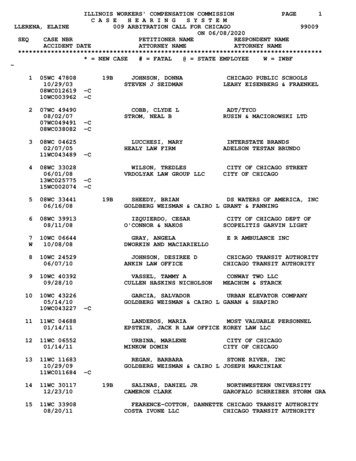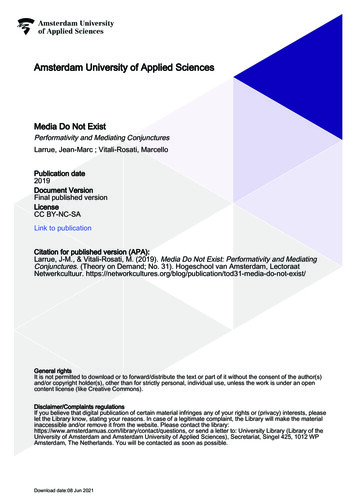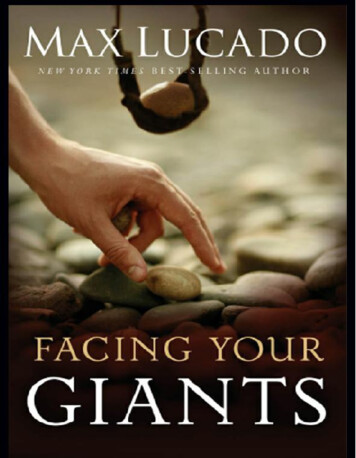
Transcription
Also by Andrea DworkinWoman H atingOur Blood: Prophecies and Discourses on Sexual PoliticsThe New Womans Broken HeartPornography: Men Possessing Women
Right-wing WomenANDREA DWORKINA Perigee Book
Perigee Booksare published byG. P. Putnam’s Sons200 Madison AvenueNew York, New York 10016Copyright 1978, 1979, 1981, 1982 by Andrea DworkinCopyright 1983 by Andrea DworkinAll rights reserved. This book, or parts thereof, may not be reproduced inany form without permission in writing from the publisher. Published onthe same day in Canada by General Publishing Co. Limited, Toronto.The author gratefully acknowledges permission from the following sourcesto reprint material in this book:The University of California Press for the excerpt from “The ComingGynocide,” in Sappho: A New Translation, Mary Barnard, translator (1973), copyright 1957 by The Regents of the University of California.New' Directions Publishing Corporation for six lines from “Canto 9 1 ”from The Cantos of Ezra Pound by Ezra Pound. Copyright 1956 by EzraPound.Portions of this book have been published in slightly different form in Ms.and Maenad.Library of Congress Cataloging in Publication DataDworkin, Andrea.Right-wing women.Includes index.1. Women’s rights— United States. 2. Con servatism— United States. 3. Right and left(Political science). I. Title.[H Q1426. D898 1982b]305.4'2'097382-9784ISBN 0-399-50671-3AACR2First Perigee printing, 1983Printed in the United States of America
AcknowledgmentsM any people went out of their w ay to help me in different w ays inthe course of my w riting this book. I owe sincere thanks to GeriThoma, Anne Simon, Robin Morgan, Catharine A. MacKinnon,Karen Homick, Emily Jane Goodman, Rachel Gold, Sandra Elkin,Laura Cottingham, Gena Corea, and Raymond Bongiovanni.I am very grateful to Sam Mitnick for supporting this projectand to all the people at Perigee involved in publishing it.This book owes its existence to Gloria Steinem, whose idea itwas that I expand an earlier essay, “Safety, Shelter, Rules, Form,Love: The Promise of the Ultra-Right” (Ms. y June 1979), into abook. I thank Gloria not only for the idea but also for her insis tence on its importance.And I thank, once again, both John Stoltenberg and ElaineMarkson, who sustain me.Andrea DworkinNew York C ityMarch 1982
For Gloria SteinemIn Memory of M uriel Rukeyser
Contents1.2.3.4.5.6.The Promise of the Ultra-RightThe Politics of IntelligenceAbortionJew s and HomosexualsThe Coming 5
Nothing strengthens the judgment and quickensthe conscience like individual responsibility. Noth ing adds such dignity to character as the recognitionof one’s self-sovereignty; the right to an equal place,everywhere conceded— a place earned by personalmerit, not an artificial attainment by inheritance,wealth, family and position. Conceding, then, thatthe responsibilities of life rest equally on man andwoman, that their destiny is the same, they need thesame preparation for time and eternity. The talk ofsheltering woman from the fierce storms of life is thesheerest mockery, for they beat on her from everypoint of the compass, just as they do on man, andwith more fatal results, for he has been trained toprotect himself, to resist, and to conquer. Such arethe facts in human experience, the responsibilities ofindividual sovereignty.Elizabeth Cady Stanton, 1892
1The Promise of the Ultra-RightThere is a rumor, circulated for centuries by scientists, artists, andphilosophers both secular and religious, a piece of gossip as it were,to the effect that women are “biologically conservative.” While gos sip among women is universally ridiculed as low and trivial, gossipamong men, especially if it is about women, is called theory, oridea, or fact. This particular rumor became dignified as highthought because it was Whispered-Down-The-Lane in formidableacademies, libraries, and meeting halls from which women, untilvery recently, have been formally and forcibly excluded.The whispers, however m ultisyllabic and footnoted they some times are, reduced to a simple enough set of assertions. Womenhave children because women by definition have children. This“fact of life, ” which is not subject to qualification, carries with itthe instinctual obligation to nurture and protect those children.Therefore, women can be expected to be socially, politically, eco nomically, and sexually conservative because the status quo, what ever it is, is safer than change, whatever the change. Noxious malephilosophers from all disciplines have, for centuries, maintainedthat women follow a biological imperative derived directly fromtheir reproductive capacities that translates necessarily into narrowlives, small minds, and a rather meanspirited puritanism.This theory, or slander, is both specious and cruel in that, infact, women are forced to bear children and have been throughouthistory in all economic systems, with but teeny-weeny time-outs
while the men were momentarily disoriented, as, for instance, inthe immediate postcoital aftermath of certain revolutions. It is en tirely irrational in that, in fact, women of all ideological persua sions, with the single exception of absolute pacifists, of whom therehave not been very many, have throughout history supported warsin which the very children they are biologically ordained to protectare maimed, raped, tortured, and killed. Clearly, the biological ex planation of the so-called conservative nature of women obscuresthe realities of women’s lives, buries them in dark shadows of dis tortion and dismissal.The disinterested or hostile male observer can categorize womenas “conservative” in some metaphysical sense because it is true thatwomen as a class adhere rather strictly to the traditions and valuesof their social context, whatever the character of that context. Insocieties of whatever description, however narrowly or broadly de fined, women as a class are the dulled conformists, the orthodoxbelievers, the obedient followers, the disciples of unwavering faith.To waver, whatever the creed of the men around them, is tanta mount to rebellion; it is dangerous. Most women, holding on fordear life, do not dare abandon blind faith. From father’s house tohusband’s house to a grave that still might not be her own, awoman acquiesces to male authority in order to gain some protec tion from male violence. She conforms, in order to be as safe as shecan be. Sometimes it is a lethargic conformity, in which case maledemands slowly close in on her, as if she were a character buriedalive in an Edgar Allan Poe story. Sometimes it is a militant con formity. She will save herself by proving that she is loyal, obe dient, useful, even fanatic in the service of the men around her.She is the happy hooker, the happy homemaker, the exemplaryChristian, the pure academic, the perfect comrade, the terrorist parexcellence. Whatever the values, she will embody them with a per fect fidelity. The males rarely keep their part of the bargain as sheunderstands it: protection from male violence against her person.But the militant conformist has given so much of herself—her la
bor, heart, soul, often her body, often children— that this betrayalis akin to nailing the coffin shut; the corpse is beyond caring.Women know, but must not acknowledge, that resisting malecontrol or confronting male betrayal w ill lead to rape, battery, des titution, ostracization or exile, confinement in a mental institutionor jail, or death. As Phyllis Chesler and Emily Jane Goodmanmake clear in W omen, M oney, and P ow er, women struggle, in themanner of Sisyphus, to avoid the “something worse” that can andwill always happen to them if they transgress the rigid boundariesof appropriate female behavior. Most women cannot afford, eitherm aterially or psychologically, to recognize that whatever burnt of ferings of obedience they bring to beg protection w ill not appeasethe angry little gods around them.It is not surprising, then, that most girls do not want to becomelike their mothers, those tired, preoccupied domestic sergeants be set by incomprehensible troubles. Mothers raise daughters to con form to the strictures of the conventional female life as defined bymen, whatever the ideological values of the men. Mothers are theimmediate enforcers of male w ill, the guards at the cell door, theflunkies who administer the electric shocks to punish rebellion.Most girls, however much they resent their mothers, do becomevery much like them. Rebellion can rarely survive the aversiontherapy that passes for being brought up female. Male violence actsdirectly on the girl through her father or brother or uncle or anynumber of male professionals or strangers, as it did and does on hermother, and she too is forced to learn to conform in order to sur vive. A girl m ay, as she enters adulthood, repudiate the particularset of males with whom her mother is allied, run with a differentpack as it were, but she will replicate her mother’s patterns in ac quiescing to male authority within her own chosen set. Using bothforce and threat, men in all camps demand that women acceptabuse in silence and shame, tie themselves to hearth and home withrope made of self-blame, unspoken rage, grief, and resentment.It is the fashion among men to despise the smallness of women’s
lives. The so-called bourgeois woman with her shallow vanity, forinstance, is a joke to the brave intellectuals, truck drivers, and rev olutionaries who have wider horizons on which to project and in dulge deeper vanities that women dare not mock and to whichwomen dare not aspire. The fishwife is a vicious caricature of thesmall-mindedness and material greed of the working-class wife whoharasses her humble, hardworking, ever patient husband withpetty tirades of insult that no gentle rebuke can mellow. The Lady,the Aristocrat, is a polished, empty shell, good only for spitting at,because spit shows up on her clean exterior, which gives immediategratification to the spitter, whatever his technique. The Jewishmother is a monster who wants to cut the phallus of her preciousson into a million pieces and put it in the chicken soup. The blackwoman, also a castrator, is a grotesque matriarch whose sheer en durance desolates men. The lesbian is half monster, half moron:having no man to nag, she imagines herself Napoleon.And the derision of female lives does not stop with these toxic,ugly, insidious slanders because there is always, in every circum stance, the derision in its skeletal form, all bone, the meat strippedclean: she is pussy, cunt. Every other part of the body is cut away,severed, and there is left a thing, not human, an it, which is thefunniest joke of all, an unending source of raucous humor to thosewho have done the cutting. The very butchers who cut up themeat and throw away the useless parts are the comedians. Theparing down of a whole person to vagina and womb and then to adismembered obscenity is their best and favorite joke.Every woman, no matter what her social, economic, or sexualsituation, fights this paring down with every resource at her com mand. Because her resources are so astonishingly meager and be cause she has been deprived of the means to organize and expandthem, these attempts are simultaneously heroic and pathetic. Thewhore, in defending the pimp, finds her own worth in the lightreflected from his gaudy baubles. The wife, in defending the hus band, screams or stammers that her life is not a wasteland of mur
dered possibilities. The woman, in defending the ideologies of menwho rise by climbing over her prone body in m ilitary formation,w ill not publicly mourn the loss of what those men have takenfrom her: she w ill not scream out as their heels dig into herflesh because to do so would mean the end of meaning itself; allthe ideals that motivated her to deny herself would be indeliblystained with blood that she would have to acknowledge, at last, asher own.So the woman hangs on, not with the delicacy of a clinging vine,but with a tenacity incredible in its intensity, to the very persons,institutions, and values that demean her, degrade her, glorify herpowerlessness, insist upon constraining and paralyzing the mosthonest expressions of her w ill and being. She becomes a lackey,serving those who ruthlessly and effectively aggress against her andher kind. This singularly self-hating loyalty to those committed toher own destruction is the very essence of womanhood as men ofall ideological persuasions define it.*M arilyn Monroe, shortly before she died, wrote in her notebook onthe set of Let's Make Love: “What am I afraid of? W hy am I soafraid? Do I think I can’t act? I know I can act but I am afraid. Iam afraid and I should not be and I must not be. ” 1The actress is the only female culturally empowered to act.When she acts well, that is, when she convinces the male control lers of images and wealth that she is reducible to current sexualfashion, available to the male on his own terms, she is paid andhonored. Her acting must be imitative, not creative; rigidly con forming, not self-generated and self-renewing. The actress is thepuppet of flesh, blood, and paint who acts as if she is the femaleacting. Monroe, the consummate sexual doll, is empowered to actbut afraid to act, perhaps because no amount of acting, howeverinspired, can convince the actor herself that her ideal female life is
not a dreadful form of dying. She grinned, she posed, she pre tended, she had affairs with famous and powerful men. A friend ofhers claimed that she had so many illegal abortions wrongly per formed that her reproductive organs were severely injured. Shedied alone, possibly acting on her own behalf for the first time.Death, one imagines, numbs pain that barbiturates and alcoholcannot touch.Monroe’s premature death raised one haunting question for themen who were, in their own fantasy, her lovers, for the men whohad masturbated over those pictures of exquisite female com pliance: was it possible, could it be, that she hadn’t liked It allalong— It—the It they had been doing to her, how many millionsof times? Had those smiles been masks covering despair or rage? Ifso, how endangered they had been to be deceived, so fragile andexposed in their masturbatory delight, as if she could leap out fromthose photos of what was now a corpse and take the revenge theyknew she deserved. There arose the male imperative that Monroemust not be a suicide. Norman Mailer, savior of masculine priv ilege and pride on many fronts, took up the challenge by theorizingthat Monroe may have been killed by the FBI, or CIA, or whoeverkilled the Kennedys, because she had been mistress to one or both.Conspiracy was a cheerful and comforting thought to those whohad wanted to slam into her until she expired, female death andfemale ecstasy being synonymous in the world of male metaphor.But they did not want her dead yet, not really dead, not while theillusion of her open invitation was so absolutely compelling. Infact, her lovers in both flesh and fantasy had fucked her to death,and her apparent suicide stood at once as accusation and answer:no, Marilyn Monroe, the ideal sexual female, had not liked it.People—as we are always reminded by counterfeit egalitarians—have always died too young, too soon, too isolated, too full of in supportable anguish. But only women die one by one, whetherfamous or obscure, rich or poor, isolated, choked to death by thelies tangled in their throats. Only women die one by one, attempt
ing until the last minute to embody an ideal imposed upon them bymen who want to use them up. Only women die one by one, smil ing up to the last minute, smile of the siren, smile of the coy girl,smile of the madwoman. Only women die one by one, polishedto perfection or unkempt behind locked doors too desperatelyashamed to cry out. Only women die one by one, still believingthat if only they had been perfect— perfect wife, mother, orwhore— they would not have come to hate life so much, to find itso strangely difficult and em pty, themselves so hopelessly confusedand despairing. Women die, mourning not the loss of their ownlives, but their own inexcusable inability to achieve perfection asmen define it for them. Women desperately try to embody a maledefined feminine ideal because survival depends on it. The ideal,by definition, turns a woman into a function, deprives her of anyindividuality that is self-serving or self-created, not useful to themale in his scheme of things. This monstrous female quest formale-defined perfection, so intrinsically hostile to freedom and in tegrity, leads inevitably to bitterness, paralysis, or death, but likethe mirage in the desert, the life-giving oasis that is not there, sur vival is promised in this conformity and nowhere else.Like the chameleon, the woman must blend into her environ ment, never calling attention to the qualities that distinguish her,because to do so would be to attract the predator’s deadly atten tion. She is, in fact, hunted meat— all the male auteurs, scientists,and homespun philosophers on street corners will say so proudly.Attempting to strike a bargain, the woman says: I come to you onyour own terms. Her hope is that his murderous attention willfocus on a female who conforms less artfully, less w illingly. Ineffect, she ransoms the remains of a life—what is left over after shehas renounced willful individuality— by promising indifference tothe fate of other women. This sexual, sociological, and spiritualadaptation, which is, in fact, the maiming of all moral capacity, isthe prim ary imperative of survival for women who live under malesupremacist rule.
*. . . I gradually came to see that I would have tostay within the survivor’s own perspective. This willperhaps bother the historian, with his distrust ofpersonal evidence; but radical suffering transcendsrelativity, and when one survivor’s account of anevent or circumstance is repeated in exactly the sameway by dozens of other survivors, men and womenin different camps, from different nations and cul tures, then one comes to trust the validity of suchreports and even to question rare departures fromthe general view. 2Terrence Des Pres, The Survivor:An Anatomy of Life in the Death CampsThe accounts of rape, wife beating, forced childbearing, medicalbutchering, sex-motivated murder, forced prostitution, physicalmutilation, sadistic psychological abuse, and the other common places of female experience that are excavated from the past orgiven by contemporary survivors should leave the heart seared, themind in anguish, the conscience in upheaval. But they do not. Nomatter how often these stories are told, with whatever clarity oreloquence, bitterness or sorrow, they might as well have beenwhispered in wind or written in sand: they disappear, as if theywere nothing. The tellers and the stories are ignored or ridiculed,threatened back into silence or destroyed, and the experience offemale suffering is buried in cultural invisibility and contempt. Be cause women’s testimony is not and cannot be validated by thewitness of men who have experienced the same events and giventhem the same value, the very reality of abuse sustained bywomen, despite its overwhelming pervasiveness and constancy, isnegated. It is negated in the transactions of everyday life, and it isnegated in the history books, left out, and it is negated by thosewho claim to care about suffering but are blind to this suffering.The problem, simply stated, is that one must believe in the exis-
tence of the person in order to recognize the authenticity of hersuffering. Neither men nor women believe in the existence ofwomen as significant beings. It is impossible to remember as realthe suffering of someone who by definition has no legitimate claimto dignity or freedom, someone who is in fact viewed as something, an object or an absence. And if a woman, an individualwoman multiplied by billions, does not believe in her own discreteexistence and therefore cannot credit the authenticity of her ownsuffering, she is erased, canceled out, and the meaning of her life,whatever it is, whatever it might have been, is lost. This loss can not be calculated or comprehended. It is vast and awful, and noth ing w ill ever make up for it.No one can bear to live a meaningless life. Women fight formeaning just as women fight for survival: by attaching themselvesto men and the values honored by men. By committing themselvesto male values, women seek to acquire value. By advocating malemeaning, women seek to acquire meaning. Subservient to malew ill, women believe that subservience itself is the meaning of afemale life. In this w ay, women, whatever they suffer, do not suf fer the anguish of a conscious recognition that, because they arewomen, they have been robbed of volition and choice, withoutwhich no life can have meaning.*The political Right in the United States today makes certain meta physical and material promises to women that both exploit andquiet some of women’s deepest fears. These fears originate in theperception that male violence against women is uncontrollable andunpredictable. Dependent on and subservient to men, women arealways subject to this violence. The Right promises to put enforce able restraints on male aggression, thus simplifying survival forwomen— to make the world slightly more habitable, in otherwords— by offering the following:
Form. Women experience the world as mystery. Kept ignorantof technology, economics, most of the practical skills required tofunction autonomously, kept ignorant of the real social and sexualdemands made on women, deprived of physical strength, excludedfrom forums for the development of intellectual acuity and publicself-confidence, women are lost and mystified by the savage mo mentum of an ordinary life. Sounds, signs, promises, threats,wildly crisscross, but what do they mean? The Right offers womena simple, fixed, predetermined social, biological, and sexual order.Form conquers chaos. Form banishes confusion. Form gives igno rance a shape, makes it look like something instead of nothing.Shelter. Women are brought up to maintain a husband’s homeand to believe that women without men are homeless. Womenhave a deep fear of being homeless—at the mercy of the elementsand of strange men. The Right claims to protect the home and thewoman’s place in it.Safety. For women, the world is a very dangerous place. Onewrong move, even an unintentional smile, can bring disaster—as sault, shame, disgrace. The Right acknowledges the reality of dan ger, the validity of fear. The Right then manipulates the fear. Thepromise is that if a woman is obedient, harm will not befall her.Rules. Living in a world she has not made and docs not un derstand, a woman needs rules to know what to do next. If sheknows what she is supposed to do, she can find a way to do it. Ifshe learns the rules by rote, she can perform with apparent ef fortlessness, which will considerably enhance her chances for sur vival. The Right, very considerately, tells women the rules of thegame on which their lives depend. The Right also promises that,despite their absolute sovereignty, men too will follow specifiedrules.Love. Love is always crucial in effecting the allegiance of women.The Right offers women a concept of love based on order and sta bility, with formal areas of mutual accountability. A woman isloved for fulfilling her female functions: obedience is an expression
of love and so are sexual submission and childbearing. In return,the man is supposed to be responsible for the material and emo tional well-being of the woman. And, increasingly, to redeem thecruel inadequacies of mortal men, the Right offers women the loveof Jesus, beautiful brother, tender lover, compassionate friend, per fect healer of sorrow and resentment, the one male to whom onecan submit absolutely— be Woman as it were—without being sex ually violated or psychologically abused.It is important and fascinating, of course, to note that womennever, no matter how deluded or needy or desperate, worshipJesus as the perfect son. No faith is that blind. There is no re ligious or cultural palliative to deaden the raw pain of the son’sbetrayal of the mother: only her own obedience to the same father,the sacrifice of her own life on the same cross, her own body nailedand bleeding, can enable her to accept that her son, like Jesus, hascome to do his Father’s work. Feminist Leah Fritz, in Thinking Likea Woman, described the excruciating predicament of women whotry to find worth in Christian submission: “Unloved, unrespected,unnoticed by the Heavenly Father, condescended to by the Son,and fucked by the Holy Ghost, western woman spends her entirelife trying to please.” 3But no matter how hard she tries to please, it is harder still forher to be pleased. In Bless This House, Anita Bryant describes howeach day she must ask Jesus to “help me love my husband andchildren. ”4 In The Total Woman, Marabel Morgan explains that it isonly through God’s power that “we can love and accept others,including our husbands.” 5 In The Gift o f Inner H ealing, Ruth CarterStapleton counsels a young woman who is in a desperately un happy marriage: “T ry to spend a little time each day visualizingJesus coming in the door from work. Then see yourself walking upto him, embracing him. Say to Jesus, i t ’s good to have you homeN ick. ’”6Ruth Carter Stapleton married at nineteen. Describing the earlyyears of her marriage, she wrote:
After moving four hundred fifty miles from my first familyin order to save my marriage, I found myself in a cold, threat ening, unprotected world, or so it seemed to my confusedheart. In an effort to avoid total destruction, I indulged in es capes of every kind. . .A major crisis arose when I discovered I was pregnant withmy first child. I knew that this was supposed to be one of thecrowning moments of womanhood, but not for me. . . Whenmy baby was born, I wanted to be a good mother, but I felteven more trapped. . . Then three more babies were born inrapid succession, and each one, so beautiful, terrified me. I didlove them, but by the fourth child I was at the point of totaldesperation.7Apparently the birth of her fourth child occasioned her surrenderto Jesus. For a time, life seemed worthwhile. Then, a rupture in acherished friendship plummeted her into an intolerable depression.During this period, she jumped out of a moving car in what sheregards as a suicide attempt.A male religious mentor picked up the pieces. Stapleton took herown experience of breakdown and recovery and from it shaped akind of faith psychotherapy. Nick’s transformation into Jesus hasalready been mentioned. A male homosexual, traumatized by anabsent father who never played with him as a child, played base ball with Jesus under Stapleton’s tutelage—a whole nine innings.In finding Jesus as father and chum, he was healed of the hurt ofan absent father and “cured” of his homosexuality. A woman whowas forcibly raped by her father as a child was encouraged to re member the event, only this time Jesus had his hand on the father’sshoulder and was forgiving him. This enabled the woman to for give her father too and to be reconciled with men. A woman whoas a child was rejected by her father on the occasion of her firstdate—the father did not notice her pretty dress—was encouragedto imagine the presence of Jesus on that fateful night. Jesus lovedher dress and found her very desirable. Stapleton claims that this
devotional therapy, through the power of the Holy Spirit, enablesJesus to erase damaging memories.A secular analysis of Stapleton’s own newfound well-beingseems, by contrast, pedestrian. A brilliant woman has found a so cially acceptable w ay to use her intellect and compassion in thepublic domain— the dream of many women. Though fundamental ist male ministers have called her a witch, in typical female fashionStapleton disclaims responsibility for her own inventiveness andcredits the Holy Spirit, clearly male, thus soothing the savage mi sogyny of those who cannot bear for any woman to be both seenand heard. Also, having founded an evangelical ministry that de mands constant travel, Stapleton is rarely at home. She has notgiven birth again.Marabel Morgan’s description of her own miserable marriage inthe years preceding her discovery of God’s will is best summarizedin this one sentence: “I was helpless and unhappy. ” 8 She describesyears of tension, conflict, boredom, and gloom. She took her fateinto her own hands by asking the not-yet-classic question, What domen want? Her answer is stunningly accurate: “It is only when awoman surrenders her life to her husband, reveres and worshipshim, and is w illing to serve him, that she becomes really beautifulto him . ”9 Or, more aphoristically, “A Total Woman caters to herman’s special quirks, whether it be in salads, sex, or sports.” 10Citing God as the authority and submission to Jesus as the model,Morgan defines love as “unconditional acceptance of [a man] andhis feelings. ” 11Morgan’s achievement in The Total Woman was to isolate thebasic sexual scenarios of male dominance and female submissionand to formulate a simple set of lessons, a pedagogy, that teacheswomen how to act out those scenarios within the context of aChristian value system: in other words, how to cater to male por nographic fantasies in the name of Jesus Christ. As Morgan ex plains in her own extraordinary prose style: “That great source
book, the Bible, states, ‘Marriage is honourable in all, and the bedundefiled. . . ’ In other words, sex is for the marriage relationshiponly, but within those bounds, anything goes. Sex is as clean andpure as eating cottage cheese.” 12 Morgan’s detailed instructions onhow to eat cottage cheese, the most famous of which involvesSaran Wrap, make clear that female submission is a
son into a million pieces and put it in the chicken soup. The black woman, also a castrator, is a grotesque matriarch whose sheer en durance desolates men. The lesbian is half monster, half moron: having no man to nag, she imagines herself Napoleon. And the










